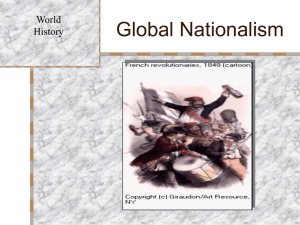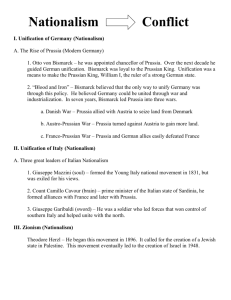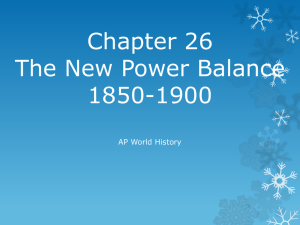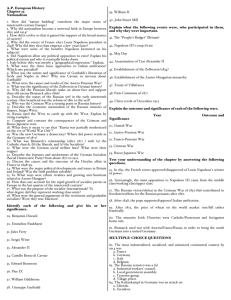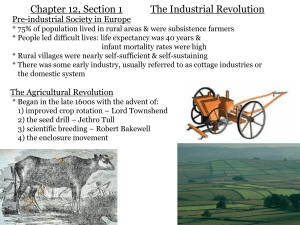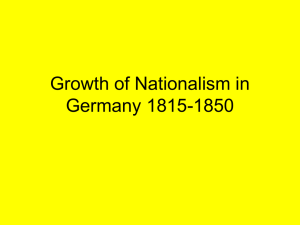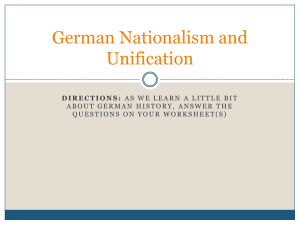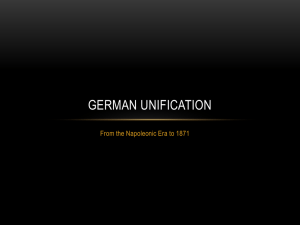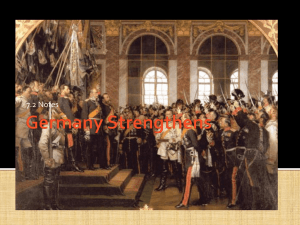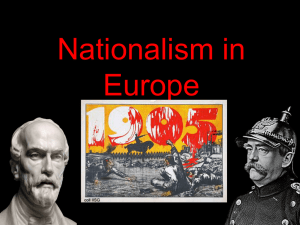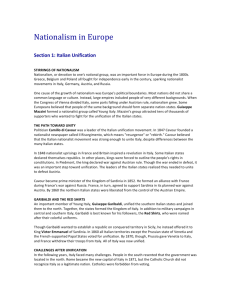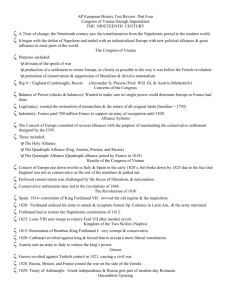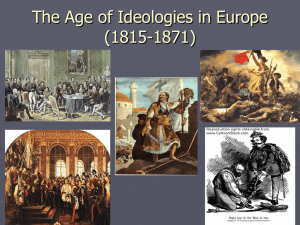Name 19th Century Nationalism- CH 19b
advertisement
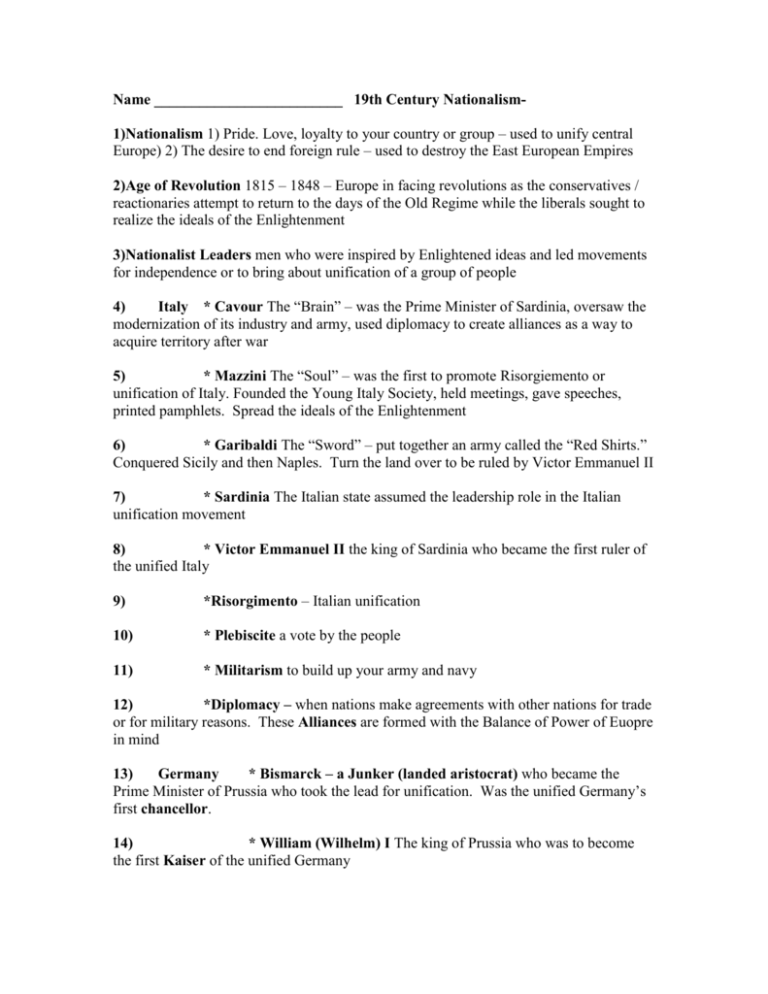
Name _________________________ 19th Century Nationalism1)Nationalism 1) Pride. Love, loyalty to your country or group – used to unify central Europe) 2) The desire to end foreign rule – used to destroy the East European Empires 2)Age of Revolution 1815 – 1848 – Europe in facing revolutions as the conservatives / reactionaries attempt to return to the days of the Old Regime while the liberals sought to realize the ideals of the Enlightenment 3)Nationalist Leaders men who were inspired by Enlightened ideas and led movements for independence or to bring about unification of a group of people 4) Italy * Cavour The “Brain” – was the Prime Minister of Sardinia, oversaw the modernization of its industry and army, used diplomacy to create alliances as a way to acquire territory after war 5) * Mazzini The “Soul” – was the first to promote Risorgiemento or unification of Italy. Founded the Young Italy Society, held meetings, gave speeches, printed pamphlets. Spread the ideals of the Enlightenment 6) * Garibaldi The “Sword” – put together an army called the “Red Shirts.” Conquered Sicily and then Naples. Turn the land over to be ruled by Victor Emmanuel II 7) * Sardinia The Italian state assumed the leadership role in the Italian unification movement 8) * Victor Emmanuel II the king of Sardinia who became the first ruler of the unified Italy 9) *Risorgimento – Italian unification 10) * Plebiscite a vote by the people 11) * Militarism to build up your army and navy 12) *Diplomacy – when nations make agreements with other nations for trade or for military reasons. These Alliances are formed with the Balance of Power of Euopre in mind 13) Germany * Bismarck – a Junker (landed aristocrat) who became the Prime Minister of Prussia who took the lead for unification. Was the unified Germany’s first chancellor. 14) * William (Wilhelm) I The king of Prussia who was to become the first Kaiser of the unified Germany 15) effort * Prussia the German state that took the lead in the unification 16) all, even principle * Realpolitik the belief that the interests of the state come before 17) * "Blood and Iron" Bismarck’s belief that diplomacy will not work, that what is needed is blood (fighting wars) and iron (building industry) 18) * Militarism – Danish War – fought with Denmark over Schleswig and Holstein. Used to take the provinces and create conflict with Austria. 18a) - Seven Week War (Austro-Prussian War) – fought to remove Austria from German affairs. Sardinia’s alliance helped in the Italian unification effort. North German Confederation organized. 19) - Franco-Prussian War used to settle claims against France and bring about the complete unification of the German states by bringing in the South German states 20) * Diplomacy – to get France to declare war, Bismarck alters two telegrams Ems Telegram (Dispatch) between the rulers resulting in Napoleon III declaring war 21) * Zollverein a trade agreement between the German states that dramatically increased their industrial development and facilitated the modernization of their army 22) * Social Programs to keep the socialists out of Germany, Bismarck’s government has to abandon laissez-faire methods and create programs to win over the workers. This included Old Age laws and Sick laws 23) * Germanization the process where a nation attempts to require all within the nation speak, dress, and act German 24) Russia - struggled against nationalism it multi-ethnic empire was in turmoil as various national groups sought independence 24a) An autocracy is a form of government in which the political power is held by a single self appointed ruler. Compare with oligarchy (literally means rule by the few) and democracy (rule by the people). 25) * Alexander I - "Savior of Europe" due to his role in defeating Napoleon, advocated the formation of an alliance of nations to crush further attempts at revolution 26) * Nicholas I made use of secret police, censorship and repression to suppress revolution. Also implemented a few reforms 27) * Alexander II - emancipated the serfs but the serfs rebelled since they were restricted and still tied to the land. So, he backed off of the reforms and crushed the rebellion. He was assassinated but he set in motion the urban migration of people who become the workers in the growing Russian industries. He also created the zemstvos or a a system of local government, introduced trial by jury, and eased censorship. Military service terms reduced 28) * Alexander III in retaliation for the assassination, he uses harsh, repressive measures to maintain absolute control. Expanded the power of the secret police, imposed censorship, and exiled critics of the government to Siberia. Also implemented a program of Russification. He also authorized pogroms against Jews and placed severe restrictions on them. 29) * Nicholas II focused on economic development, building railroads (TransSiberian RR), factories and mines. Secured foreign investment, political and social problems came with industrialization, and socialists spread the ideas of Karl Marx. Fired on protestors on “Bloody Sunday”, Created the Duma (an elected legislature) with the October Manifesto, but he dissolved it and used arrests, pogroms, and executions to keep control. Also lost the Russo-Japanese war in 1905 that caused tremendous humiliation 30) * Russification suppression of non-Russian culture, promoting the Russian language, and the Russian Orthodox Church 31) * anti-Semitism anti-Jewish policies / actions 32) * pogroms state sponsored violence against a group (Jews) 33) * jingoism extreme nationalism – my country or group before all others 34) * dynasty rule by a power family or group 35) * feudalism exchange of land and service for protection. In the 19th Century, Russia was still feudal 36) * ethnic diversity having many different ethnic groups within the empire 37) * Crimean War Fought between Russia and Great Britain, France, Sardinia, and the Ottoman Empire in 1853 - 54 over a) Control of warm water ports in the Black Sea and access to the Mediterranean b) With Russia expanding its territory, Britain was concerned about its possessions in the East c) France under Louis Napoleon was seeking to increase French national prestige by reasserting French claims to be the protector of the holy places in Palestine, putting them in conflict with the Russians who made claims. Russia initially won a major victory, however, Great Britain and France forced it to give up its gains. 38) * Mensheviks the conservative group of the Marxist / socialists who felt that it was too soon for a working class revolution, so they had to wait. 39) * Bolsheviks the radical group of Marxist / socialists who felt that they were a revolutionary group that would carry out the revolution, that the revolution had to happen now, and they would keep thing running until the working class emerged 40) Ottoman Empire - "Sick man of Europe" a multi-ethnic empire that was virtually helpless as nationalities within the empire and nations from outside continued to weaken and break up the empire 41) Austro-Hungarian Empire – referred to as the Duo-Monarchy, as special arrangement was made with Hungary to pacify the Magyars 42) * Francis Joseph a Hapsburg and emperor of Austria and king of Hungary 43) * dual monarchy a political arrangement in which Hungary had some level of autonomy but had the Austrian leader as their king 44) * Magyars the largest ethnic group in the Austrian empire 45)Dynasties – Bourbon (France) , Hapsburg (Habsburg) (Austria, Span), Hohenzollern (Prussia / Germany), Romanov (Russia), Ottoman (Turkey)
